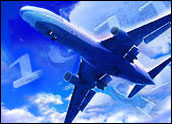
The Federal Aviation Administration announced Monday it will study the use of portable electronic devices on airliners, potentially opening the door to allowing greater use of smartphones, tablets or e-readers during flights.
Currently, the FAA requires airlines to determine which devices can safely be used in-flight, and all U.S. airlines now ban the use of devices such as mobile phones, laptops and e-readers during takeoff and landing. The FAA is re-examining that policy, however, and will further study the safety concerns associated with use of the devices, with the exception of voice calls on mobile phones.
More Productive
While safety is its first priority, the FAA explained, it understands that with the rapid rise in smartphone and electronic device use, consumers want to spend more time using their devices on flights.
If certain devices, including smartphones and tablets, are found to be safe during landings and takeoffs, a change in policy could allow business travelers to be more productive while travelling. While many airlines now offer WiFi connections once an aircraft is at cruising altitude, new standards could add 20 minutes or more on either end of a flight for travelers to use their devices.
A working group made up of experts from the mobile technology and aviation manufacturing industries and associations for passengers, flight crews and airlines will assemble this fall.
The group will meet for six months to discuss the safety and technical challenges associated with the use of portable electronic devices during a flight and changing data-sharing plans between aircraft operators and manufacturers.
At the end of the six months, it will present its findings to the FAA
The FAA did not respond to our request for further details.
Keeping Customers Happy
Aside from technical worries, however, there are concerns that allowing the use of devices, particularly for voice calls, might create an undesirable atmosphere on a plane, Carl Kuwitzky, president of the Coalition of Airline Pilots Associations. A lift on the regulations could actually lead to unruly conversations that bother the other members of the flight sharing such a confined space.
“From what I have heard and seen discussed publicly, some passenger groups are opposed to lifting the current retractions due to fellow passengers talking on their phones and becoming an annoyance in flight,” he told TechNewsWorld.
However, the FAA group stated Monday that during its investigation it will not consider the use of cellphones for voice communications during flight.
Evolving Flight
As long as passengers can’t disrupt fellow travelers with loud conversations, many flight crews would like the FAA to expand its policies on electronic devices, said Albert Helfrick, professor of electrical & systems engineering at Embry-Riddle Aeronautical University.
In addition to a rise in productivity for business travelers, it can also help keep passengers, especially children, more engaged during the most tense portions of a flight.
“There’s always been this desire to allow passengers to use electronic devices for more of a flight period,” Helfrick told TechNewsWorld.
With the evolution of aeronautical science changing toward GPS-based navigation, that’s a real possibility, he said.
“GPS signals are inherently very weak, which means there might be more disruption,” he said. “However, they emit higher frequencies, where a lot of these modern devices such as e-readers emit energy at much lower frequencies. So, with the switch to GPS, it’s possible that interference doesn’t exist with certain devices. It’s possible the airlines are going to say they went a little overkill with the policies and turn some of these around.”





















































